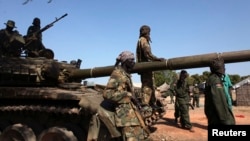South Sudan's military is battling rebels in the northern Upper Nile state region on Wednesday, amid international concerns that unrest in the world's newest country could spiral into a full-fledged civil war.
Army spokesman Philip Aguer told VOA fighting continues in the oil town of Malakal, the capital of Upper Nile state.
Forces loyal to President Salva Kiir are battling soldiers who back his former deputy, Riek Machar, who was dismissed in July.
On Tuesday, the rebels said they had captured Malakal -- a claim the government denied.
Doctors Without Borders says hundreds of people have been wounded over the past few days from fighting in Upper Nile, Unity and Jonglei states.
In a Wednesday statement, the relief group said it had treated 116 people for gunshot wounds in Malakal and the Upper Nile state community of Nasir.
Presidential spokesman Ateny Wek Ateny, on Wednesday, called for unity and said the government forces would prevail.
"The SPLA (Sudan People's Liberation Army) will fight courageously and will defeat the rebels within and outside South Sudan borders," Ateny said. "The government will defeat the rebels forever. His excellency Kiir Mayardit instructed the government to stand ready to defend the nation from internal aggression. He urged all South Sudanese to stand together and see this dark moment through."
Representatives of both sides have been meeting in Ethiopia for talks on a possible cease-fire.
The U.N. says the unrest has left at least 1,000 people dead and more than 400,000 displaced.
In Washington, Linda Thomas-Greenfield of the State Department's African Affairs Bureau urged South Sudan's leaders to seek reconciliation.
"Each day the the conflict continues, the risk of all-out civil war grows and tensions continue to rise," she commented during a congressional hearing. "Let me conclude by saying that I am gravely concerned that the crisis in South Sudan has the potential to escalate even further. South Sudan's leaders on both sides are breaking their promises to their own people."
On Tuesday, Secretary-General Ban Ki-moon expressed alarm at the rising number of people who have been killed or forced from their homes by the conflict.
Army spokesman Philip Aguer told VOA fighting continues in the oil town of Malakal, the capital of Upper Nile state.
Forces loyal to President Salva Kiir are battling soldiers who back his former deputy, Riek Machar, who was dismissed in July.
On Tuesday, the rebels said they had captured Malakal -- a claim the government denied.
Doctors Without Borders says hundreds of people have been wounded over the past few days from fighting in Upper Nile, Unity and Jonglei states.
In a Wednesday statement, the relief group said it had treated 116 people for gunshot wounds in Malakal and the Upper Nile state community of Nasir.
Presidential spokesman Ateny Wek Ateny, on Wednesday, called for unity and said the government forces would prevail.
"The SPLA (Sudan People's Liberation Army) will fight courageously and will defeat the rebels within and outside South Sudan borders," Ateny said. "The government will defeat the rebels forever. His excellency Kiir Mayardit instructed the government to stand ready to defend the nation from internal aggression. He urged all South Sudanese to stand together and see this dark moment through."
Representatives of both sides have been meeting in Ethiopia for talks on a possible cease-fire.
The U.N. says the unrest has left at least 1,000 people dead and more than 400,000 displaced.
In Washington, Linda Thomas-Greenfield of the State Department's African Affairs Bureau urged South Sudan's leaders to seek reconciliation.
"Each day the the conflict continues, the risk of all-out civil war grows and tensions continue to rise," she commented during a congressional hearing. "Let me conclude by saying that I am gravely concerned that the crisis in South Sudan has the potential to escalate even further. South Sudan's leaders on both sides are breaking their promises to their own people."
On Tuesday, Secretary-General Ban Ki-moon expressed alarm at the rising number of people who have been killed or forced from their homes by the conflict.





